#London Irish Centre
Text
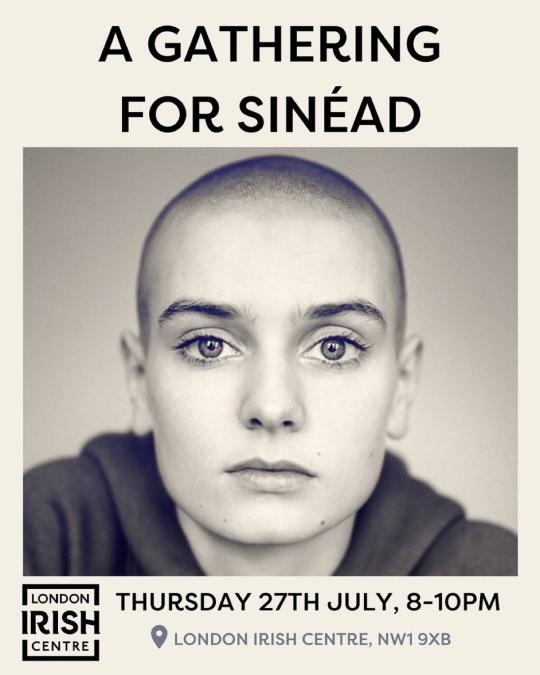
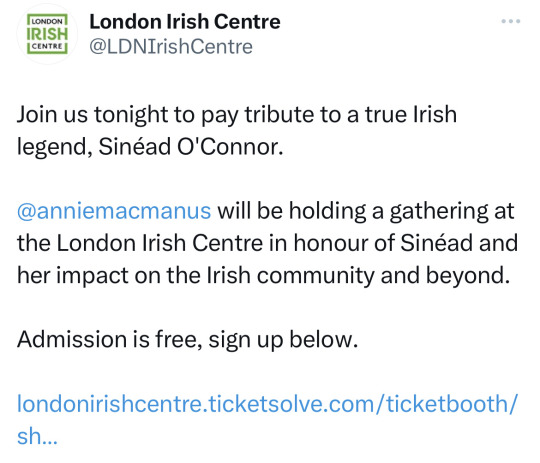
Twitter
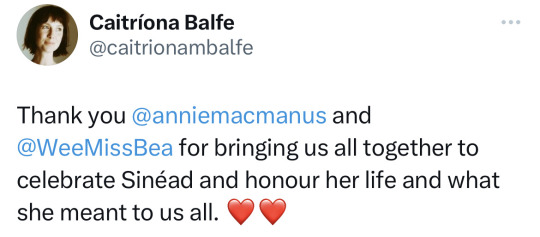
Twitter
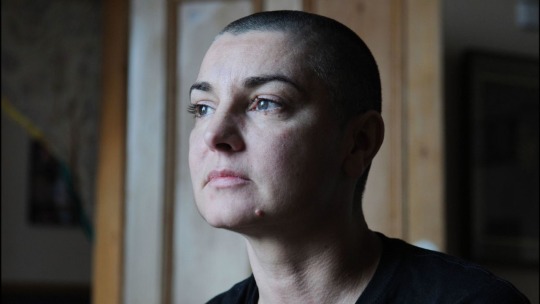
Sinead O'Connor at her home in County Wicklow, Republic of Ireland in 2012. David Corio/Redferns/Getty Images
Caitríona Balfe, Michael Stipe and more pay tribute to Sinéad O’Connor
On Wednesday, as the news of Sinéad O’Connor’s death broke, many celebrities took to social media to pay tribute to the music icon.
As reported by Irish broadcaster RTE earlier in the day, O’Connor’s death was confirmed by a family statement. No cause of death was immediately available.
“I hope you are at peace,” actor Caitríona Balfe wrote on her Instagram page, adding “and with your baby boy. Thank you for sharing your soul with us and soothing us with your incredible voice beautiful Sinéad.”
O’Connor contributed her vocals to the opening credits of Season 7 of acclaimed series “Outlander,” in which Balfe stars. The actor’s mention of O’Connor’s “baby boy” was in reference to the singer’s son Shane, who died by suicide at age 17 in 2022.
Michael Stipe, famed REM singer-songwriter, simply wrote on Instagram aongside a photo of him with O’Connor that “there are no words.” Stipe has spoken about how much he was influenced by O’Connor, telling the Washington Post in a 2020 interview that “so many people have lifted from her, from me to Miley Cyrus. She’s one of our great, living icons.”
Belinda Carlisle, lead vocalist of the all-girls 80s rock band The Go-Gos, wrote “may she find peace now. Forever loved,” on her Twitter page on Wednesday, while singer-songwriter Melissa Etheridge wrote on her page that news of O’Connor’s death “is such a tragedy.”
“What a loss. She was haunted all her life. What a talent,” Etheridge continued. “I remember my first Grammy show meeting this small shy Irish girl.”
The Cranberries – who lost their lead singer, the Irishwoman Dolores O’Riordan, in 2018 – shared a tribute on their official Instagram account, writing that they “are shocked and saddened to hear of Sinead’s sudden passing. We have all been big fans for many years. Our thoughts are with her family.”
Shirley Manson, lead singer of Garbage, posted in honor of O’Connor to the band’s Instagram page, writing, “I’m heartbroken.”
“This disgusting world broke her and kept on breaking her. Godspeed dear fragile dove,” the post continued. “Thank you for all the beauty and all the wise teachings you offered up to us. I wish you nothing but peace and I will love you for all of time.”
O’Connor’s contemporary Annie Lennox shared a poem in the late singer’s memory on her Instagram, beginning it with, “You bared your soul… | Shared your brilliance | Through exquisite artistry”.
Oscar-winner Jamie Lee Curtis penned a lengthy tribute to O’Connor on her Instagram page, saying, “I once heard Sìnead (sic) sing acapella in an empty chapel in Ireland. It was under construction at the private home of our host. It was one of the most beautiful things I’ve ever heard in my life.”
“I loved her. Her music. Her life,” Curtis added, going on to reminisce about the time she spent with O’Connor at a music festival.
“Sixth Sense” actor Toni Collette also shared a personal memory with O’Connor, writing on Instagram, “I was lucky enough to hang out with her a few times in my twenties. On one occasion we all sang in the hills of Wicklow in Eire. I sang a Jane Siberry song and Sinead then asked/encouraged me to sing one of my own. Can you imagine the terror? The intimidation? The thrill?!”
“She was so talented, so generous, humble, resilient, courageous and true,” Collette continued. “What a voice. What a force. My heart breaks.”
Beyond those in the arts, O’Connor’s impact was felt in her home country of Ireland.
“What Ireland has lost at such a relatively young age is one of our greatest and most gifted composers, songwriters and performers of recent decades, one who had a unique talent and extraordinary connection with her audience, all of whom held such love and warmth for her,” Irish president Michael D. Higgins said in a statement sent to CNN.
“May her spirit find the peace she sought in so many different ways,” his statement concluded.
CNN
Remember… you bared your soul… shared your brilliance through exquisite artistry. — Annie Lennox
#Tait rhymes with hat#Good times#Sinéad O’Connor#A Gathering For Sinéad#London Irish Centre#27 July 2023#London#CNN#26 July 2023#Twitter
26 notes
·
View notes
Text
Niall's reel linked in his IG stories
Wednesday, February 14th, 2024; as of 11:19 am est
4 notes
·
View notes
Text
View from Camden Square, London, 2023, acrylic on canvas paper, 508x405mm, available

#view #camdensquare #london #irishcommunitycentre #sustrans #oliveryuchanart
11 notes
·
View notes
Text
culture in March
March, what a month, not so much walking but scurrying, although some culture has been had!
March has seen its fair share of cold weather and the long walks have been thin on the ground. I have been getting around from borough to borough, Keeping out of the cold. The benefits of having an Oyster + travel card (for those outside of London, it is a free pass for Londoners that hit the grand age…

View On WordPress
0 notes
Text
awful tweet warning:

Before I describe everything that's wrong with this tweet, let me transcribe Stephen Fry's words:
I am Stephen Fry, and I am a Jew. The great Irish thinker and writer Conor Cruise O'Brien once said that antisemitism is a light sleeper. Well, it seems to have woken up of late. The horrendous events of October 7th, and the Israeli response, seem to have stirred up this ancient hatred. It's agonizing to see all violence and destruction that is unfolding, and the terrible loss of life on both sides brings me an overwhelming sadness and heartache. But whatever our opinions on what is happening, there can be no excuse for the behaviour of some of our citizens. Since October the 7th, there have been 50 separate reported incidents of antisemitism every single day in London alone, an increase of 1350%, according to the Metropolitan police. Shop windows smashed, stars of David and swastikas daubed on walls of Jewish properties, synagogues, and cemeteries. Jewish schools have been forced to close. There is real fear stalking the Jewish neighbourhoods of Britain. Jewish people here are becoming fearful of showing themselves, in Britain, in 2023.
(Then it cuts off.)
For those who still don't know why this tweet was ignorant and inane, let me explain.
"To hear him conflate antiZionism with antisemitism has shocked me."
Guess how many times Stephen Fry mentions zionism? Zero! Guess how many times he mentions the country of Israel? Zero! (Unless you count "the Israeli response" which is unrelated to the existence of the country, or Zionism at all.) What this person is saying, is that they consider the smashing of shop windows, and the vandalism and marking of Jewish property, to be anti-Zionism. Considering they are an anti-Zionist, by following their logic, we can conclude that they not only believe this destruction and harassment is acceptable, but they believe it is ethical.
Further, they accuse him of showing no care for the Palestinians, even though he explicitly states that the loss of life on both sides brings him overwhelming sadness.
Finally, they accuse him of "[Centring] people in this country". It is disturbing that this person believes one cannot be concerned over two issues at a time. It perpetuates the idea that we can only talk about the "worst oppression" and talking about anything else means you are complicit in "silencing" someone else. If this were true, we would not be allowed to talk about Gaza either, or Ukraine, or police brutality, racism, islamophobia, homophobia, transphobia, and so on and so on, because clearly there are other issues with hundreds of thousands more deaths, and millions more displacements, so why bring attention to it ever?
Unfortunately, people are not talking about those countries, like Syria, Yemen, Ethiopia, Congo, and more, and anyone who does is spammed with "free Palestine" comments. In fact, the most I've heard people talking about Sudan is when these TikTok geopolitical experts attempt to spam the Palestinian flag and get it wrong.
This is not new. This is obviously not new. I have seen tweets like these every single day in the hundreds for the last 80 days. It is not surprising that people think smashing windows is "anti-zionism", nor that they think it good. It is not surprising that they hear a Jew speak, and experience shock and disgust, regardless of what we say.
I do wonder if they would regard anything short of a second Holocaust as antisemitism.
#antisemitism#i/p#jumblr#israel#palestine#stephen fry#israel palestine conflict#leftist antisemitism#gaza#avi posts
1K notes
·
View notes
Text
And until we meet again...
Last Thursday evening, The London Irish Centre organized a two-hour celebration of Sinéad O' Connor's life and legacy, which was attended by C, if we trust both her carefully worded post and her stans' fawning all over Twitter:
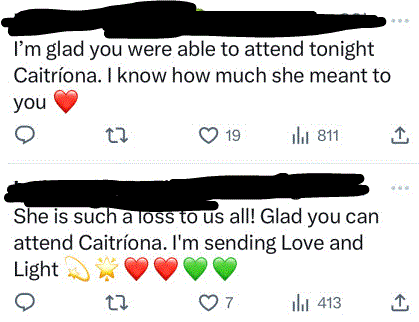
For an event of such amplitude it got fully booked in less than six hours from its announcement, there is surprisingly little available content on socials. Bear in mind I even did check their IG, and found only this short reel:
C is nowhere to be seen, either on stage or in attendance and I highly doubt they wouldn't have included her somehow. And I really paid attention, looked and ogled and took off my glasses and almost pulled my laptop screen near the tip of my nose. To no avail.
On such short notice, the Embassy/Centre would include anyone of note available and in attendance, by the way: I know very well how it's done. These happen on the regular, in my world, and I am often asked to help. LOL.
However, in all fairness, I also spotted this (sorry for the very crude/non-existent editing skills and the very ugly red arrow: it's almost half past four in the morning, here):
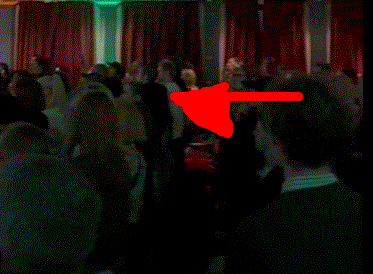
If McSideburns went there, he might have gone by himself. How convenient, to send the PA, when you are probably somewhere else entirely.
Where on Earth is Carmen Sandiego?
To be honest, I could not care less, as long as it's not with that greasy-haired social zero. I know what I know, and it is enough.
Maybe our super-sleuths could spot her, in which case my world would not be shattered. At all. So I simply leave this here and open for debate:
What do you think?
Back to my #Jottings and happy to have one more day off, for sure.
168 notes
·
View notes
Text



─ •✧ CATHERINE'S YEAR IN REVIEW : FEBRUARY ✧• ─
1 FEBRUARY - Catherine appeared in a video for Shaping Us Campaign.
2 FEBRUARY - Catherine appeared in a video with Roman Kemp as part of the Shaping Us Campaign.
4 FEBRUARY - Kensington Palace released a childhood photo of Catherine with Michael Middleton for the Shaping Us Campaign.
5 FEBRUARY - She visited St. John's Primary School to mark the start of Children's Mental Health Week 2023.
8 FEBRUARY - Catherine was received by His Majesty's Lord-Lieutenant of Derbyshire (Mrs. Elizabeth Fothergill) as she visited Landau Forte College along with Captain Harpreet Chandi.
9 FEBRUARY - Catherine and William were received by His Majesty's Lord-Lieutenant of Cornwall (Colonel Edward Bolitho) at the National Maritime Museum Falmouth in Discovery Quay. Afterwards, they visited the Dracaena Centre.
19 FEBRUARY - Catherine and William attended the British Academy Film Awards at the Royal Festival Hall where and were received by His Majesty's Lord-Lieutenant of Greater London (Sir Kenneth Olisa).
21 FEBRUARY - She was received by His Majesty's Lord-Lieutenant of the Royal County of Berkshire (Mr. James Puxley) at the Oxford House Nursing Home in Slough.
22 FEBRUARY - Catherine held an Early Years Meeting.
23 FEBRUARY - Catherine received Mr. Ian Hewitt (Chairman, AELTCC ) at Windsor Castle. Subsequently, she received Major General Christopher Ghika and Lieutenant Colonel James Aldridge (Regimental Lieutenant Colonel & Commanding Officer) of the Irish Guards.
25 FEBRUARY - Catherine and William met the volunteers and staff of the Welsh Rugby Charitable Trust and attended the Six Nations Rugby Match between Wales and England at the Principality Stadium in Cardiff. They were received by His Majesty's Lord-Lieutenant of South Glamorgan (Mrs. Morfudd Meredith).
28 FEBRUARY - Catherine and William were received by His Majesty's Lord-Lieutenant of West Glamorgan (Mrs. Louise Fleet) at Brynawel House Alcohol and Drug Rehabilitation Centre in Pontyclun. Afterwards, they visited Aberavon Celtic Leisure Centre, where His Majesty's Lord-Lieutenant of Mid Glamorgan (Mr. Peter Vaughan) received them. Subsequently, they were received by His Majesty's Lord-Lieutenant of Dyfed (Miss Sara Edwards) as they opened the new patient room at Wales Air Ambulance in Dafen.
#year in review 2023 : catherine#year in review : 2023#year in review : catherine#catherine review : february#review 2023#review february#british royal family#british royals#royals#catherine middleton#kate middleton#royal#british royalty#royalty#brf#duchess of cambridge#princess of wales#the princess of wales#princess catherine#princess kate#royaltyedit#royalty edit#my edit#prince of wales#the prince of wales#prince william
68 notes
·
View notes
Photo

Storming of Bristol
The storming of Bristol, a port then second only in importance to London, on 26 July 1643 by Royalist forces led by Prince Rupert (1619-1682) was a major coup against the Parliamentarians during the English Civil Wars (1642-1651). The Royalists were able to break through the long perimeter fortifications, which were manned by a defensive force spread too thinly. Taken in a day but with many casualties on both sides, Bristol became a vital Royalist centre until its fall to the Parliamentarians after the siege of 1645.
From Edgehill to Bristol
King Charles I of England (r. 1625-1649) considered himself an absolute monarch with absolute power and a divine right to rule, but his unwillingness to compromise with Parliament, particularly over money and religious reforms, led to a civil war from 1642 to 1651. Fought between the 'Roundheads' (Parliamentarians) and 'Cavaliers' (Royalists) in over 600 battles and sieges, the war was a long and bloody conflict. The northern and western parts of England largely remained loyal to the monarchy but the southeast, including London, was controlled by Parliament. The Parliamentarians also controlled the Royal Navy, a significant impediment to Charles receiving reinforcements from the Continent and Ireland. The king would need a port if the war dragged on, but if he could capture London in a decisive engagement, perhaps the war would be quickly over. Charles made his intent clear and raised the royal colours at Nottingham on 22 August 1642.
The first major engagement of the war had been the Battle of Edgehill in Warwickshire on 23 October 1642, which ended in a draw. Charles then delayed and captured Oxford before turning on London, where he was rebuffed by the presence of a 20,000-strong Parliamentarian army at Turnham Green. The king decided to fight another day and retreated to Oxford, which became the Royalist capital. A series of skirmishes and small-scale battles followed over the next year as neither side sought to commit all of their troops in a single field engagement. Rather, both sides concentrated on capturing what strategically valuable towns and cities they could. There were, too, half-hearted negotiations to bring peace through the winter and spring of 1643, but it seems that both sides were confident that they could press their advantage better on the battlefield when warmer weather arrived.
The indecisive nature of the war so far had not helped the Royalists in their predicament concerning sea power. In the summer of 1643, Prince Rupert, Count Palatine of the Rhine and Duke of Bavaria, Charles' nephew and commander of the Royal cavalry, was tasked with capturing Bristol, second only to London as the kingdom's most important port and an important regional military stronghold. Bristol was a major commercial centre, exporting such regional goods as cheese from the Wessex vales and importing many vital raw materials. It was a naval base and so could control the Irish Sea, and it was a major regional administrative centre. At the time, Bristol had a civilian population of around 15,000, making it the second-largest city in England after the capital.
Rupert, who was still only 23, had gained invaluable experience during the Thirty Years' War (1618-1648) in Central Europe. Rupert had been involved in the siege of Breda in 1637 and had fought well, if a little impetuously, in the Civil War so far, notably at Edgehill. Bristol was his next important target, but he would have to overcome the city's defences which he knew the value of, having himself advised the king (and been ignored) that Royalist cities should be heavily fortified.
Continue reading...
28 notes
·
View notes
Text



NEW ABOUT RIVALS 💯💯💯💯
New article in the Harper's Bazaar UK, October Issue, to promote "Rivals"!
Amazing photoshoot !
Here is the article of the Harper's Bazaar Uk magazine !!
Thanks to Emma Jones for the written transcription ! 🙏👍🌺
Harpers Bazaar - October 2024
BEST OF ENEMIES
Bazaar recreates the fictional county of Rutshire to meet the cast of Rivals, a new TV adaptation of Jilly Cooper’s racy 1980s blockbuster
As Jilly Cooper’s Rivals leaps rambunctiously to our screens, we meet the cast of the saucy new show
It’s 1986 and, high over the Atlantic, a London-bound Concorde is about to break the sound barrier. Most passengers continue smoking, flicking through magazines and ordering martinis, while the rattling WC door indicates that two are currently joining the mile-high club. Moments later, an unruffled, glamorous couple emerge triumphantly from the loo and the tannoy announces that supersonic speed has been reached: everyone whoops; glasses are clinked; and the thumping chorus of ‘You might as well face it/you’re addicted to love’ is amped up. This is the opening scene of Rivals, the much-anticipated new television adaptation of Jilly Cooper’s bestselling novel, and it’s so unsubtle that, even alone in a dark screening bunker below the streets of Soho, it makes me splutter with laughter. It is also irresistible.
The 1988 book is a classic of the Cooper canon and part of the Rutshire Chronicles, a series based in a fictional Cotswolds county that follows the lives and loves of the affluent elite – an area the team behind its new, and first, on-screen adaptation are well-versed in bringing to life. Produced by A Very English Scandal ’s Dominic Treadwell-Collins and written by Laura Wade, who was behind The Riot Club, Disney+’s eight-part drama is also executivelyproduced by both Cooper and her literary agent Felicity Blunt. It is largely faithful to the novel but, as that has 700 pages and 79 characters listed by name and personality trait in an A-Z at the front, the show necessarily homes in on the central plot lines.
The two main protagonists are Rupert Campbell-Black (played by Alex Hassell), a former Olympic-gold show jumper turned Conservative MP (and, incidentally, the ‘best-looking man in England’); and Declan O’Hara (Aidan Turner), an Irish broadcasting star who leaves the BBC to move to Rutshire with his actress wife Maud and children Taggie, Caitlin and Patrick. Declan’s new employer, Corinium Television, is run by David Tennant’s vile Lord Tony Baddingham and his sidekick Cameron Cook, an American producer he has lured over from New York, depicted by the US native Nafessa Williams. They are joined by a large supporting cast that includes Danny Dyer and Emily Atack.
The titular rivalries are many and varied, primarily centred on the struggle to win the local TV franchise; simultaneously, characters lock horns over love, money, class, pets, politics and property, while presenting chat shows, throwing parties and playing nude tennis. The resulting viewing experience is both a period drama that seems set on another planet and a series exploring themes that still resonate today.
Cooper – who, at 87, is still in full ownership of her signature cloud of coiffed hair, inimitable charisma and a hundred-mile-an hour conversation – loved working on the project. ‘It’s terribly exciting,’ she tells me, with an amazed shake of the head. ‘Other books of mine have been televised and it was awful – but with this, we took casting very seriously and I can’t fault any of them.’
During a break on Bazaar ’s shoot, Turner tells me how Cooper gave a cocktail party for the cast in her garden, and what a ball they all had filming in the West Country last summer. (The latter is clear: he’s delighted to see his co-stars, including the mongrel Pontie, who plays Gertrude, the O’Hara family dog, and some of her canine colleagues brought along for a day in front of the camera.)
The series appealed to the Poldark star immediately. ‘I thought the scripts were really, really funny – line-wise, I have some crackers,’ he says. Turner’s Declan is a big-hearted if self involved journalist, wrestling to reconcile his bosses’ desire to monetise his charm, his own dream of writing a Yeats documentary and the need to bread-win for his profligate family. Although this push and pull between being commercial and creative, between the professional and the personal, plays out in a larger-than-life fashion, it still somehow feels familiar to a modern viewer. ‘That’s the sign of really good television, isn’t it, when it holds the mirror up to our present,’ says the actor. ‘What have we thrown in the trash? What still needs to change?’
The ways in which prejudices have evolved in the past 40 years are thrown into quite harsh relief in the show. Casting a Black actress to play Cameron Cook, the damaged but resilient hot-shot American producer, gives the series an opportunity to delicately include a glimpse of the regularity of what we’d now recognise as racist micro aggressions. Equally, Cameron’s strength is joyful to witness. ‘Such a spicy, smart character – especially a Black woman, who can carry her own and get her way in the male-dominated world of that time – I wanted to sink my teeth into that,’ Williams says. ‘I also love the glamour: the red lip, the red nails.’ (The cast have embraced the scarlet-stiletto emoji – a replica of the original image on the classic book cover – as their unofficial series motif when posting on social media.)
The changing dynamics between men and women are portrayed with a light touch. Victoria Smurfit read Cooper as a teenager, and has now adored playing Declan’s wife Maud O’Hara – an insecure, attentionseeking former actress, the kind of mother who arrives at her son’s New Year’s Eve 21st-birthday party in the Cotswolds on a camel. ‘There are aspects of Rivals that make you think, “Oh my Lord, can you believe they got away with this back then?”’ the Irish actress says. ‘But in the show, it’s delivered in such a clear, fun, gentle, appalled way that a 2024 audience can digest it very easily.’ When I suggest the series has made more of the women and ensured they have three dimensions, perhaps to modernise the story a little, she makes a good point: that Cooper’s male characters – be it the rakish Rupert Campbell-Black or the angelic Lysander Hawkley of The Man Who Made Husbands Jealous – may seem the most famous because it was mostly women reading the books, and the author had designed her heroes – or antiheroes – to be ‘their perfect man’. ‘But look closely, and the women are not less than the men,’ she says. ‘Essentially, every character wants something they don’t have – usually love and safety – whether from their partners, animals or colleagues. Women in this world are entering the era of “having it all” and are learning to be open about what they want – and, by the same token, we are starting to see a softer side to the men.’
This is embodied perfectly in Bella Maclean’s Taggie O’Hara, the delightful, very dyslexic cook and daughter of Declan and Maud: on screen, she has slightly more twinkle in her eye than in the book – a good decision, as otherwise Taggie could be seen as almost too virtuous to be true to a modern audience. ‘But it’s so nice playing someone with a really strong backbone – it slightly rubs off on you,’ says the actress, who appeared in the latest Sex Education series and has just shone as the lead at the National Theatre’s London Tide. ‘Among all the silliness, the shoulder pads and mad hairdos, there’s always an undercurrent of something thought-provoking,’ she says of the show that could prove to be her career’s turning point. ‘There’s a love story that blossoms out of something really unpleasant. There’s light and shade.’
But the figure with perhaps the most chiaroscuro is Rupert Campbell-Black, Cooper’s number-one character, into whose shoes Alex Hassell is amazed to be stepping. Hassell is a seasoned RSC actor, with turns in The Miniaturist and His Dark Materials, whose theatre company The Factory counts Mark Rylance and Emma Thompson among its patrons. ‘I’m also from Essex, with dark features,’ he points out wryly, in reference to the white-blond locks and blue eyes of his new alter-ego, both of which are oft-alluded to in the books, and about which many young women dreamed in the 1980s and 90s. (Cooper was initially appalled.) ‘Rupert exudes privilege and confidence, so I had to learn a loucheness. It was helpful that everyone was told to treat me as if I was extremely attractive,’ he continues, laughing. ‘When you walk into a room of supporting artists who’ve been briefed to fall over themselves looking at you, smouldering becomes a lot easier. They imbued me with a certain power.’
In the Rivals prequel Riders, there are some pretty unpalatable aspects of Rupert’s personality – particularly the way he treats women and animals – that haven’t aged well. ‘We never explicitly had this conversation, but for my portrayal of Rupert, we’ve kept some parts of that history and taken out others. In our version, there’s a loneliness to him: he is a shit, but he has a kindness.’
However, there are two elements of Cooper’s storytelling to which the show stays steadfastly loyal: the abundance of sex and wordplay. Rupert’s dialogue is riddled with quips – some very clever, some very… Eighties. Hassell’s favourite is delivered just as Rupert is getting down to it, and involves a pun that combines Tories and the clitoris. ‘It was a hard sell,’ he says, laughing.
His character and storyline – which takes Rupert on, dare I say, a journey – are key to the show’s charm, pace, plot and sociopolitical signposting. What would Hassell like viewers to make of the series? ‘I hope people enjoy it, have conversations about the knottier topics it raises, and maybe have sex later,’ he says. ‘I say that jokingly, but – and maybe this is high hopes – perhaps for people who don’t talk to one another that much, as the series goes on, watching it with someone else might allow certain things to come to light.’
Cooper is delighted by this possibility. ‘Well, we’re philanthropists, aren’t we? I keep reading that the birth rate is going down like mad. Putting Rivals on the telly may help,’ she says, with the enthusiasm of a writer who has long had one foot in showbusiness: in her forties, she appeared in her capacity as a celebrity columnist on the BBC game show What’s My Line, and wrote a sitcom about a four-girl flat-share with Joanna Lumley in the lead role.
Revisiting the world she created – and partially lived in herself – 40 years ago has been bittersweet: it made her miss the era (‘it was much more naughty’), but also her late husband (‘there’s a lot of darling Leo and his jokes in the book’). Indeed, what today’s viewers may not clock is the real people Cooper drew on to shape several fictional figures, namely the ‘glamorous aristocratic types who were floating about when I, middle-class Jilly, moved to the country in ’82’. Rupert Campbell-Black, for example, is a patchwork of Andrew Parker Bowles, the late Earl of Suffolk and the fashion designer Rupert Lycett-Green. Her ‘beloved’ Taggie is entirely made up, but the scruffy Lizzie Vereker – a novelist whose husband cheats on her – is, she admits, based on herself: ‘She is nicer than me, though. I love her – that’s terribly narcissistic to say, but I do.’
Like her conversation, Cooper herself still rattles along at a good clip – last year, she released a bonkbuster about football inevitably titled Tackle!; this May, the King presented her with a damehood for services to charity and literature, and she’ll be tapping away at her typewriter on various secret projects right up to the very moment she is dragged out of rural Gloucestershire to the premiere of Rivals.
To all these endeavours, Dame Jilly continues to bring the same philosophies she always has: a disregard for snobbery (like many great minds, she rereads Proust and loves Helen Fielding) and a straightforward goal of contributing to the gaiety of the nation. ‘Maybe one day I’ll write something serious,’ she says. ‘But, at the moment, there’s some terrible sadness and loneliness, isn’t there? So, more than ever, and more than anything, I’d like to cheer people up.’
‘Rivals’ is released on Disney+ in October.
13 notes
·
View notes
Text
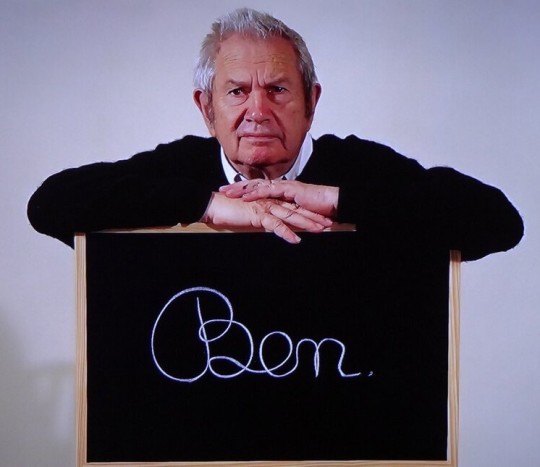
Ben Vautier
French conceptual artist known for his work featuring handwritten texts with quirky messages that had mass appeal
The French conceptual artist Ben Vautier – known simply as “Ben” – who has died aged 88, was best known for his Écritures – trademark painted epigrams in a simple cursive script on a monochrome background.
Instantly recognisable with their bold messages to the world, sometimes humorous, often political, always thought-provoking, his “writings” shout out from the canvas as if craving to be heard. “In my Écritures it is not the aestheticism that counts,” Ben said in 2010, in conversation with the curator Hans Ulrich Obrist. “I write to be read and understood. It’s the meaning that has to come across.”
The first Écriture, created in 1953, said, simply: “Il faut manger. Il faut dormir” (“You have to eat. You have to sleep”). It was an affirmation of life and the beginning of a series that would define his oeuvre for more than 70 years.
And, escaping from the walls, these mini-manifestos, which originated in the experimental culture of the Nice school of the 1950s, and Fluxus movement of the 60s, are now ubiquitous across France, to be found on postcards, stamps, wine labels, stationery and rucksacks.
Following Ben’s death, President Emmanuel Macron said: “On our children’s pencil cases, on so many everyday objects and even in our imaginations, Ben had left his mark, made up of freedom and poetry, apparent lightness and overwhelming depth.”
Born in Naples, Italy, Ben was the son of an Occitan French-Irish mother, Janet (nee Giraud), and a Swiss father, Max-Ferdinand Vautier. His grandfather was the Swiss painter and illustrator Marc Louis Benjamin Vautier. Following his parents’ divorce, Ben lived with his mother in Switzerland, Turkey, Egypt and Italy before they settled in Nice aged 14.He left the city’s Lycée du Parc Impérial at 16 and worked at a bookshop, Le Nain Bleu, where he first discovered volumes on the artists who would influence him. Interviewed last year for Forbes magazine and asked about his early artistic encounters, Ben said: “I picked only artists who shocked me because I was looking for something new, so I started with the abstract painters: Poliakoff, Soulages and Picasso. The shock of Marcel Duchamp came from a meeting with Arman, and after that, I opened up to the possibility that everything was art.”
“Everything is art” became his lifelong mantra, together with the other driving principle for Ben that “art must be new”. Elsewhere he said “My art will be an art of appropriation. I seek to sign everything that has not been signed. I believe that art is in the intention and that it is enough to sign.” When the Italian artist Piero Manzoni died in 1963, Ben signed his death certificate and declared it a work of art. And, following the birth of Ben’s daughter, Eva, in 1965, he signed her, as a new creation and a “living sculpture”.
Between 1958 and 1973 he ran a shop, Laboratoire 32, selling secondhand records, cameras, books and other publications. The space became a favourite meeting venue for artists of the Nice school, such as Yves Klein, César and Arman. N’importe quoi (Just anything), an installation composed of the shop’s interior, was acquired by the Centre Pompidou in 1975 and remains a testament to those early years in Nice.
In 1962 Ben had come to London as part of the festival of Misfits to perform a geste (happening) that involved spending two weeks living and sleeping in the window of Gallery One in Grosvenor Square, Mayfair. That year he met George Maciunas, founder of Fluxus, the Dada-influenced movement whose members, including Yoko Ono, Joseph Beuys and John Cage, engaged in experimental performances and events.
Fluxus encouraged a “do-it-yourself” approach in its artistic creations, valuing simplicity above complexity. Ben’s work embraced this approach and made the movement’s aesthetic clearly visible to the public, in art galleries and beyond.
Striking works include the self-referential Je suis transparent (I am transparent, 1970), a print edition in black writing on a see-through perspex background; and If art is everywhere it is also in this box (1972), with inscriptions in French, English, Italian and Nissart (a subdialect of Provençal), decorating four sides of a large plastic cube.
Initially selling as multiples in limited editions at his shop in the 60s, his productions soon moved into the mainstream, making his signed works available as mass-produced “Ben”-branded objects. He believed that there was “no art without ego”.
His works are now in private and public collections worldwide, including MoMA in New York and the Stedelijk museum in Amsterdam. Retrospectives have been held at the Musée d’Art Contemporain in Lyon (2010), Museum Tinguely, Basel (2015) and Museo Universitario de Arte Contemporaneo, Mexico (2022).
Arriving as a visitor in 2000 to Ben’s home in Saint-Pancrace, in the heights above Nice, which he shared with his second wife, Annie Baricalla, an artist whom he married in 1964, I was struck by the volume and variety of work that lay within and in the grounds of the house.
Commenting on this cuckoo-in-the-nest among a row of bourgeois residences that looked like a combination of fine art gallery, circus and junkyard, Ben confided with a chuckle: “Mes voisins me detestent.” (“My neighbours hate me.”)
He was a champion of minority languages, campaigning especially for Occitan – the tongue of southern France – and others, including Alsatian, Basque and Corsican, to be recognised in a country whose only official language is French. He reasoned that by preserving the vernacular, one can preserve the culture and dynamism of its people.
Ben’s first marriage, to Jacqueline Robert, in 1959, ended in divorce. Following Annie’s death on 5 June, “unwilling and unable to live without her”, according to a statement by his children, “Ben killed himself a few hours later”.
He is survived by his daughter, Eva, and his son, François, from his marriage to Annie.
🔔 Ben (Benjamin Vautier), artist, born 18 July 1935; died 5 June 2024
Daily inspiration. Discover more photos at Just for Books…?
7 notes
·
View notes
Text



from Niall's IG stories - will post full reel in next post here
Wednesday, February 14th, 2024; as of 11:17 am est
2 notes
·
View notes
Note
HI ARJA I’m so curious about your moby dick AU lol you always have the best AUs
HI ROWAN I'm glad you asked! :D
It's gonna be a big ass rant, so it's under the cut. I'm very excited about this AU, it tackles some things I love and have first-hand experience of, so yeah, I'll be chatty about it ahahahah.
I've posted a chapter at random on AO3 and you can find some snippets in the whale au tag!

So, it's "Zoologist Aisling who thinks whales are the best thing after sliced bread saves Cullen, who happens to have survived a shipwreck caused by a whale". Shenanigans happen.
It was an idea of @shivunin (thank you again) and I'm currently trying to give it a little outline not to go totally at random. I am thinking about characters background, it's a non-magical AU and so stuff needs to be adapted. The title of the WIP is old, I realised after that... You know, it's a Moby Dick INSPIRED thing. The first idea was having Aisling as Melville and Cullen as Ishmael teaming up to write Moby Dick. Cullen has the sailing parts, Aisling filling in with conspiracy theories about whalers and spite over naturalists. And both of them inserting a gay relationship because I'm still a big part of the Bi!Cullen agenda, and that book is terribly gay.
I did realise later on that there's a limit to the horrors I'm willing to put characters through and write, and cannibalism is really NOT one. I also moved it to another period and to the 1900s because I already did research for another original project and I'm more familiar with it.
The title of the file will change when I'll have a better one for this AU.
For now I do have a background for Aisling, what she's in Nantucket to do, and I'm so happy to say @melisusthewee jumped on the bandwagon aboard with Quinn and Horatio, but I'm letting her introduce you to them in this. I'll just say that Aisling refers to Quinn as "Mr Arch-Nemesis".
She's in Nantucket for a research over sperm whales behaviour, restore her family's name (dad was a scholar too, but alas, he was caught being a member of the Fenian society and giving money to the Irish revolutionaries... She's the Royal Society's favourite person, yes) and hopefully put a brake on whale hunting (the 1900s saw the peak of killed whales, you can bet miss "I'd adopt a dragon if Bull didn't constantly prevent me to try and befriend one" won't be ok with it).
Dorian and Josephine -whom I couldn't fathom being there with her, seriously I can't picture Dorian on a ship if not in first class, unless he was beaten unconscious before boarding and dragged on. Josie finances ships, sure... but being on board of one and working? A whole different thing. So, they're Aisling friends, but they stayed in London to get her fundings.
Cullen needs to find reason to get to the sea again, he was a harpooner and worked on ships all his life... After being the sole survivor, he needs to find his centre back and get on with it. The crazy whale fangirl may or may not help him on this.
And there was only one bed, of course.
(have I already said that Moby Dick is VERY gay?)
(I had a blast reading it, thank you so much @salsedinepicta for making me curious about it! <3 Also if you want to throw your characters in this GO ON.)
I thiiiink I may change names and design and also do something fully original. I'm particularly enthusiastic about it because it allows me to tackle stuff I experienced in my life (I did some sailing! Very little and purely recreational, but still) and to re-use some research I already did for another original project which I love dearly, but it's definitely more than I can chew on my own.
If I don't chicken out because the place is linked to some trauma, I maaaaay add a part in the seaside town I spent a lot of time growing up.
But again, let's see how it goes, researching on Italy isn't the easiest thing ever if you're not aiming at Rome or the Renaissance, and we're talking about a pretty regional side of Italy. I have good hopes because the people are very very very much into their own history and claiming it back, so I may find some good infos without spitting too much blood.
it's a work in progress, but there's gonna be more about this!
10 notes
·
View notes
Text
So this morning, cs my brain is fried in many ways,
As a companion to the Draculas of New Jersey, have all the Frankensteins of England -
First, on the very first census, of 1841, we have Jacob Frankenstein and his family, living in Liverpool -

There really wasn't much detail on early census records, and whoever's filled this in has done it a slightly odd order (dad, youngest son, mum, oldest daughter, middle son), but we see we have Jacob Frankenstein, who is a merchant, his wife Sarah, and their children Henrietty (age 5), Samuel (age 3) and Nathan (age 1 or possibly 7), and that F in the last column marks them as "born in Foreign Parts".
The house they live in, they seem to share with two other families - an English roper, his wife and four children, and an Irish tailor his wife and their servant. I imagine, if I might, that it may have been one of those tall buildings you get in the town centre occasionally, with a shop below and two or three storeys above - the tailor would have the shop and the floor above, and the one/s above that would be split between Frankenstein and Choppers (the roper)
I'm not certain, cs nothing much is certain on the 1841 census, but I think that must be the case, because there's a 1 for 1 dwelling/building, and then the families have little notch marks separating them (you can just see one above the J in Jacob there).
If we skip forward 20 years, we find them not in Liverpool, but having moved to Islington, London

A little more detail on this record - we find out that Jacob and Sarah are from Hanover, which I gather is now a part of Germany. Henrietty has anglicised her name to Harriet, and that N must be Nathan, which means he was 1 on the 1841 record. We also see Harriet was born in Yorkshire, and Nathan in Liverpool, tho I can find neither record. And that Jacob's merchant-ing is going well enough that they needn't share housing and they actually have a live-in maid!
And, there's another record to show he joined the Freemasons in about 1850, so I imagine he was doing fairly well for himself.
-
There is, at the same time as our Jacob in 1841, another J Frankenstein, but this one is an "agent" - whatever that means 180 years ago - and he lives in Stepney!

He is also "of Foreign Parts" and also in his 30s, but he is instead a lodger, with several other single German-sounding men (you can see Doctor Gotentag above him there), in the house of some laundresses (Sarah Kelly, Elizabeth Pryor, and her daughter Sarah)
I jumped forward 10 years to 1851, and couldn't confirm finding this same Frankenstein, but there are a couple of new ones -
We have Adolphus, a tailor from Breslau who is lodging in Manchester with a Polish hawker and his family

And we have Isaac, a licensed hawker - a seller of things, the type that shout you over, like a marketstall man, tho maybe without a stall - in this case, jewellery - and he lodges in Portsea/Portsmouth, with Kitty Barnard and her daughters.

-
Then, if we jump again to the 1870s, there are a great many more Frankensteins -
We have Jacob, Israel, Simon and Harris Frankenstein, who are all Polish tailors (tho sometimes the record says "Russia Poland"). Israel and Simon live in London, Whitechapel and Spitalfields respectively. Jacob is in Cheetham and Harris is in Manchester. And all their families, too.
Also in Cheetham, we find Reub and his family - I imagine he is Jacob's brother or cousin (he is also listed "Russia Poland") - he is a glazier, and his teenage sons are tailors.
Philip Frankenstein, also in Cheetham and from Poland and so likely another brother or cousin, is a waterproof manufacturer (did macks exist then?).
And Leon, who lives in Rochester, married a Kentish woman called Lydia Jolley (nee Gladdish), and he is a picture frame maker, also Polish - tho he, unlike the rest, is listed under "Poland, British Subject" - either, he lived in England most of his life and was just born in Poland (see, my John Scarth, who always listed himself as "Portugal, British Subject", and was from Orkney), or because he married an Englishwoman, I'm not sure, and he, nor the census man, are not here to quiz.

If I go any later, I imagine there'll be a great deal many more records to trawl through and I don't really want to, so I shan't.
I am mildly disappointed there are no Adam Frankensteins, tho, I did check
#research#genealogy#i should say - tho i don't know much jewish history beyond the last century - that these are most if not all polish jews#(who knows about leon and his wife#if either converted or if she was jewish to start with)#i would say they were fleeing a polish/russian pogrom but i don't know their reasons for moving#i do know that henrietty/harriet is buried in willesden united synagogue cemetery
17 notes
·
View notes
Text
'Andrew Scott and Paul Mescal might just be the most emotionally devastating couple you will see on screen this year. In the sensational All of Us Strangers, Scott plays Adam, a lonely screenwriter living in a near-empty London tower block. When he meets his neighbour, Mescal’s Harry, the two begin a tentative love affair, finding solace in each other’s arms. It is a film that deals with all manner of high-intensity emotions – grief, parental love, seclusion, loneliness, bullying, coming out. The protagonists’ sexualities are an intrinsic part of them and their story – but so are many other things.
“There is a gay storyline at the centre of it that we thought would appeal to LGBTQ audiences,” says Scott, who grew up believing he would never play lead roles because he was gay.
“But we’re dealing with lots of different forms of love. I don’t think people give a f**k about what sexuality they are when they respond to this film. It just wouldn’t be true to say that it’s just gay people [who] respond to this film. People get it. They get it and I love the fact that people are talking about love and they’re talking about emotionality and they’re so moved by it.”
“I think the least groundbreaking thing about this film is actually the sexuality,” agrees Mescal, who pinpoints the more universal emotions, such as loss, as the real heart of the movie. “That to me is remarkable and groundbreaking.”
Scott and Mescal are sitting together in an overly beige hotel suite. Scott, 47, is dressed in a white Lacoste jumper, while the 27-year-old Mescal is more casual still in a white T-shirt. They are relaxed in each other’s company, and spent the weekend in their homeland for the Irish premiere. “It felt cathartic,” says Mescal. “A great celebration of the film.”
Scott has been nominated for a Golden Globe for Best Actor and is delighted by the reception the film has been getting. “Genuinely wonderful,” he beams.
All of Us Strangers is the brainchild of writer-director Andrew Haigh, who previously proved his talents for shedding light on human frailty with the gay one-night-stand tale Weekend (2011) and 45 Years (2015), which starred Charlotte Rampling and Tom Courtenay as an elderly couple whose relationship quietly implodes in the run-up to their 45th wedding anniversary.
Haigh clearly has an eye for formidable on-screen pairings. “I don’t think [Scott] has had a lead film role like this,” the director tells me. “And so that kind of excited me… I love the idea of taking someone that you might not have seen do something and then seeing them do it.”
He cast Mescal after seeing him playing the quiet, lost student Connell in the 2020 TV phenomenon Normal People. “It was clear that his star was on the rise.”
Since then, Mescal has been Oscar-nominated for 2022’s father-daughter indie Aftersun, proving Haigh’s intuition was spot-on. “It’s like he’s been blown out of a rocket into stardom.”
Despite all its immensely human themes, All of Us Strangers is also a ghost story. As Adam attempts to write about his childhood, he starts to revisit his family home and encounters his mother and father (Claire Foy, Jamie Bell), who are delighted to see him. Except something is amiss. They look straight out of the 80s –which they are. Both died decades earlier in a car crash when Adam was 12 – he is now, somehow, communicating with their ghosts. It seems he has the chance so many wish they had: to say things to loved ones after they are gone. One of those things is that he is gay. It is one of the film’s most touching scenes, as he explains, unashamedly, with Foy’s prissy suburban housewife shocked by the revelation.
Both Scott and Haigh are gay, and while the scene elicits laughter at her outdated views, it must surely speak to their own experiences.
“I remember growing up in the 80s, and it was a very rough time to be gay,” says Haigh.
“Back then people did not like gay people. And families did not like the idea of their children being gay. So I think it’s really important to remind us that that’s how the world used to think.”
As Adam’s visits continue, we see how his parents, as he imagines them, soften and accept him. We also see how much regret they bear that they did not do this when he was a bullied child, crying in his room. To borrow from the Frankie Goes to Hollywood song that features heavily in the film, it is a hymn to the power of love.
“I think it’s about the idea that you have to let love in,” says Scott.
“You can survive, and you can trap yourself and lock yourself away. But you’ve got to let it in. Because [otherwise] what’s the point of having the privilege of breathing in this world?”
True enough. But it is also a film about isolation and the way, especially in big cities, we can cut ourselves off from those around us.
Like the characters, “I’ve lived in an apartment block that felt like I had no connection to my neighbours”, says Mescal.
“I have too,” nods Scott. “Also, not to be cliché about it, but both of us are Irish. And there is a – what’s the word? – friendliness that’s part of our culture. You see people on the road and you wave at them. You say ‘Hi’. It’s quite chatty, I suppose. London, it’s four times the size of the population of Ireland. I’ve certainly had a thing where I think I’m going to try to make friends with the person – or at least acknowledge the person – who works in my local supermarket that I see every day. For me, that’s kind of important to establish community.”
Their Irishness bonded Scott and Mescal, but there is an effortless, easy-on-the-eye chemistry between them that goes beyond a common nationality. Haigh says they were trying to get across a plethora of different things – “intimacy and tenderness and compassion… and sexiness”.
“I had an unjustified confidence in the fact that Andrew and I would get on professionally,” says Mescal. “And personally, I think that’s ultimately what people are saying when they describe chemistry. Chemistry is kind of like this magic word. Does it look like those two people like and love each other?”
Harry tenderly bathes Adam at one point; in another scene, they take drugs in a gay club, with Adam gently requesting Harry take care of him.
“Chemistry is so situational,” says Scott, whose equally charged chemistry with Phoebe Waller-Bridge when he played the “hot priest” in Fleabag brought him further into the mainstream in 2019.
“The imagination of the audience creates chemistry. If they like us as actors, they’re going to have an excitement about putting those two people in the same room. There’s a lot of different things, as well as our relationship, that dictates it and then you work on the actual physicality. But chemistry isn’t just about sexual chemistry. It’s about loads of different forms of chemistry.”
Encouragingly, Haigh reports that there was no “pushback” on any of the film’s more explicit sex scenes. “Everybody was very supportive about how to tell the story,” he adds.
“I do think it does show progress [in telling queer stories]. This isn’t a tiny film made for $500,000. This is a slightly bigger film. And I do think that we have progressed to a stage where we can tell these kinds of stories; whether they become massive blockbusters, of course, is a different matter, because of course they won’t. It’s not Barbie; it’s a different type of movie.”
Sadly, the Academy failed to nominate All of Us Strangers for any Oscars this week. Nevertheless, Mescal feels it is important even to be in the conversation.
“Films of this scale and size are so important to me,” he says. “[There] should be space for more films like this. If we need to free up more space by getting rid of ‘X’ film or ‘Y’ film every year, I think that would be a good compromise. Audiences actually love being challenged. I don’t think they want to go to the cinema and be thinking about what time it is or what their Facebook or Instagram feed is doing.”
Both actors have big-budget projects up next. Mescal stars in Ridley Scott’s Gladiator 2, while Scott plays Patricia Highsmith’s charming serial killer in Netflix’s Ripley, due out in April. But it is films like this that seem to matter to him most. “Of course, we all love a bit of fast food,” he says. “I’m not saying there isn’t room for that. But if that becomes the pervasive thing we all consume, it’s just a little unhealthier.”
All of Us Strangers is “nutritious” by comparison. “This film, I have no doubt, will continue to connect with people for years. And that is genuinely thrilling.”'
#Andrew Scott#Andrew Haigh#All of Us Strangers#Paul Mescal#Hot Priest#Fleabag#Normal People#Gladiator 2#Ridley Scott#Patricia Highsmith#Netflix#LGBTQ#Lacoste#Golden Globes#Weekend#45 Years#Charlotte Rampling#Tom Courtenay#Claire Foy#Jamie Bell#Aftersun#Oscars
7 notes
·
View notes
Text
New rioting across UK cities, UN voices concern over violence in Belfast
Rioters threw petrol bombs, bottles and bricks at police officers in the Northern Irish capital Belfast on Monday night.
The violence erupted overnight in a series of protests across the UK since last week, with a crowd of more than 200 people gathering outside the Islamic Centre in Belfast.
According to the Belfast Telegraph newspaper, police and drones were on the scene and police also used Attenuating Energy Projectiles (AEP) against the rioters.
Monday night’s violence was largely driven by Loyalists, who traditionally oppose Irish nationalists who seek unity between Northern Ireland and the Republic of Ireland. First Minister Michelle O’Neill wrote on X following earlier disturbances on Saturday, which saw some businesses owned by Muslim refugees destroyed or damaged:
“There is no place anywhere on our island for racism or attacks on minority communities.”
O’Neill also said it is “essential to ensure that those responsible for causing and orchestrating the racist violence on Saturday face the full force of the law.”
Protests by disgruntled residents
Britain has been gripped by riots for days, with crowds spewing racist and Islamophobic remarks, attacking Muslims, minorities and migrants.
The riots were fuelled by misinformation circulating on the internet that the suspect arrested after a fatal stabbing in Southport, England, last week was a Muslim asylum seeker, which turned out to be a false claim.
Three little girls were killed and five other children were seriously injured in the knife attack while attending a dance class last Monday.
Groups of disgruntled people are preparing for more violence targeting asylum and immigration centres in London and across the UK on Wednesday.
On Tuesday, the UN Human Rights Office expressed concern over the ongoing violent protests in the UK. Noting that the Office is closely following the unrest and violence that has erupted in different parts of the country over the past few days, a spokesperson for the Office told Anadolu Agency:
“As in any other State, we are concerned at violent incidents, including attacks on police, as well as instances of islamophobia and attacks against mosques, attacks against centres housing asylum seekers and migrants, and anti-migrant rhetoric.”
Thameen Al-Kheetan emphasised that while the right to peaceful assembly is fundamental, it must always be exercised peacefully. He also added:
“Advocacy of racial or religious hatred that constitutes incitement to discrimination, hostility or violence, is unacceptable and must be prohibited.”
He also welcomed the UK government’s commitment to tackling violence under the law at the “highest level.” Al-Kheetan also added:
“We urge the Government effectively to respond to incitement to hatred — especially when it targets segments of the population who are in the most vulnerable situations, such as asylum seekers — in a manner that complies fully with international human rights norms and standards.”
Read more HERE

#world news#news#world politics#europe#european news#uk#uk politics#uk news#england#united kingdom#islamophobia#london#britain#southport#southport stabbing#southport attack#southport riot#belfast
2 notes
·
View notes
Note
Anon rebelde
Como bien señalas en la cena hay matrimonios entonces, que impide que Cait acuda a la misma con el que dice que es su esposo? O ese *esposo solo le sirve de vez en cuando para para calentar los ánimos en un fandom fácilmente caldeable? Ya sabemos que Sam está en Londres así que Cait no puede estar allí y en Glasgow tampoco, esas obras no acaban nunca 🤣
Dear (returning) Anon Rebelde,
Y muy reactiva, hoy. 😉 Como se dice en Chile: 'a ver, a ver/por qué llora esta mujer'?
'As you very well observed, there were couples invited to that dinner. So, why would Cait not be there with the one she says it's her husband? Or would that be that the *husband* is only useful once in a while, to fire up tempers in a fandom that's easily heated? We know that Sam is in London, so Cait cannot be there or in Glasgow, so it never ends. 🤣'
You know I agree with everything you wrote, spare one detail: S was apparently not in LHR in October, when the Belfast dinner took place. I had to go look at my archives and make some sense of the context. And although I am not Marple, I couldn't help but notice last October was a very active networking/promo/shit show month for both of them, as the SAG-AFTRA strike was still not over yet.
Just a short summing up:
October 4, 2023 - C's 44th birthday and another mysterious donation to Project CaiTreena/One Tree Planted. S in NYC for drinks and Departures interview with Sophie Mancini. Fandom gets ballistic speculating - an empty 💩, of course.
October 5, 2023 - S in NYC for the Keepers of the Quaich US Chapter gala, with Norouzi (as I predicted) and Mancini. C's whereabouts unknown - not the US, I suppose. Maybe in LHR, re-enacting that Prophet Song excerpt, on behalf of the Booker Prize?
October 8, 2023 - C spotted in LHR for Harrods Iconic Dining Hall Relaunch hosted by Stanley Tucci, with McIdiot (the only time, that month!). Hullaballo ensues for something very close to a nothing burger. S supposedly in GLA, as shown by FaceTime snippet convo with Amanda Tutschek, Venice Beach topless artist extraordinaire. Date of above FaceTime snippet - unknown.
October 10, 2023 - S confirmed in GLA, likely latergram (IG SS gin pics taken on own driveway). C confirmed in LHR, first by Gareth Bromell, then by Getty Image pics at Loewe Foundation's Studio Voltaire Award. Sans McIdiot.
October 17, 2023 - S signs APUK's Palestine letter, whereabouts unknown (my bet is on NYC/Nevis). C confirmed in LHR at the Portia Coughlan play Press Night/After Party, Almeida Theatre. Sans McIdiot, but with Tobias. LOL.
October 19, 2023 - S on Jimmy Fallon's Tonight Show, in NYC. Ring ding ding proves to be a very effective lookie here, not there prop. C's whereabouts unknown, as S's in the October 10-17 interval (Nevis? both? That would be my best bet, and yeah, go ahead and screech. I DGAF).
October 25, 2023 - S confirmed in GLA, despite posting 'from Nevis' the same day and shirtless thirst trap the next day. C's whereabouts unknown? Not really, I should say.
Back to the Northern Irish dinner - bear with me, Anon Rebelde, I am trying to pinpoint a date, here. Begin Again, Jeffers' book that prompted it, was out in the US on October 2 and in UK/Canada and Ireland on October 10:
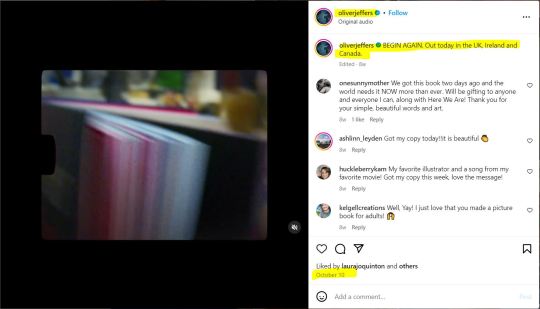
October was a dementedly busy month for the author, as shown by the excruciating dates of his North American and UK book launch tours (https://www.oliverjeffers.com/begin-again-book-tour):
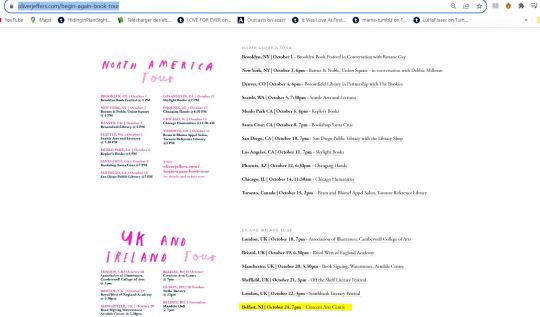
One of the events surrounding this launch was held at Belfast's Crescent Arts Centre in partnership with No Alibis Bookstore, on October 24. Best thing? He is dressed exactly like in the NYT article pics.
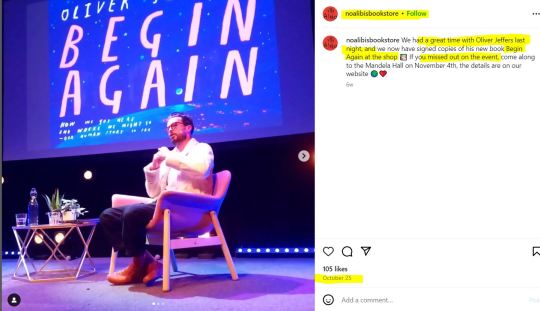
My best bet is that dinner took place in Belfast on October 24, Anon Rebelde or at the latest on October 25 (next to 0 chance, given the identical attire, but let's allow some margin of error to our estimate).
As for Jeffers' position on the Israel-Hamas Gaza War (which, may I remind you, started on October 7), I think this is a very clear statement:
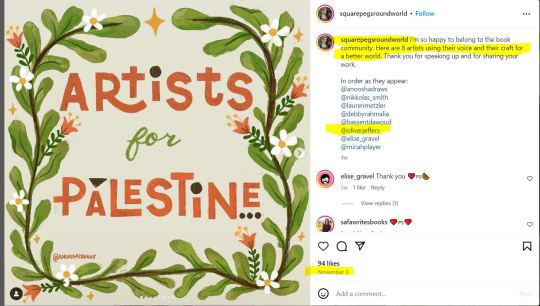
You draw your own conclusions, Anon Rebelde. I am here to try and bring some clarity in a shitstorm, not brainwash you.
Always waiting for your input, which is much appreciated! Hasta luego, hija de la rebeldía!
youtube
PS: The timeline game was fucking exhausting. I am not the Securitate, so you won't see me play at that any time soon :)
58 notes
·
View notes